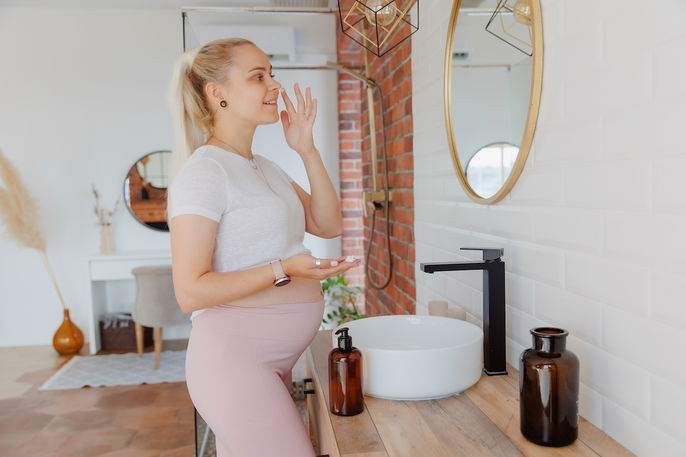Pregnancy acne typically occurs due to hormonal changes that are normal pregnancy. These changes can increase oiliness of the skin and promote the production of sebum and pimples.
Pregnancy acne will usually present with pimples on the face, chest and back, as these are places where there is a higher concentration of sebaceous glands. To combat increased sebum production, you should cleanse the skin with a neutral or mild face wash.
Treatment for pregnancy acne is usually guided by an obstetrician or dermatologist, and involves daily skin cleansing or the use of topical products that are safe for use during pregnancy.

Common causes
Pregnancy acne is usually related to the increased production of estrogen and progesterone. Higher levels are normal during pregnancy, and are needed for bodily changes in the woman for optimal fetal development.
These hormonal changes also promote sebum and oil production, leading to oil and dead cells to accumulate the base of glands in the skin. This can obstruct and inflame the leading, causing pimples and acne.
Pregnancy acne is usually more intense in the first trimester and tends to decrease by the end of pregnancy, after childbirth and during breastfeeding, as hormonal levels decrease and skin oiliness becomes more controlled.
How to prevent
To prevent pregnancy acne, you can use the following measures:
- Do not use excess makeup, and always remove it correctly as it can accumulate and clog the skin pores
- Wash your skin with neutral or mild soap, twice a day (morning and night), as this can prevent blackheads and pimples from forming
- Apply a tonic lotion, without alcohol or acids, after washing and drying your face
- Apply an oil-free, non-comedogenic moisturizer in a small amount to your face
- Do not expose yourself to the sun excessively, as UV radiation can accelerate the formation of pimples
- Apply non-greasy sunscreen daily, with at least SPF 3
- Opt whole grains foods and omega-3 sources, like salmon and sardines, as they help regulate blood sugar and reduce skin inflammation, which causes pimples. Learn more about foods that help with acne that you can incorporate into your diet.
Furthermore, it is important to be careful with your diet, and to avoid fatty or high-sugar foods. Be sure to keep yourself hydrated by drinking at least 8 glasses of water per day.
Treatment options
Treatment for pregnancy acne should be carried out as directed by a family doctor, obstetrician or dermatologist, as most medications, even topical ones, are contraindicated and can affect the baby's development.
Some topical products, such as azelaic acid, or some a /wintibiotics, are considered safe for use during pregnancy and may be prescribed by your doctor for more severe acne.
It is important for pregnant women to only use medications as approved by their doctor, and to avoid using medications on their own at any point of pregnancy. Medications taken particularly in the first trimester and affect the development and formation of the baby's main organs and systems.
What not to use
During pregnancy, acne products that are completely contraindicated for use:
- Topical retinoids, such as tretinoin, adapalene, or tazarotene
- Oral retinoids, such as isotretinoin (Roaccutane), acitretin or etretinate
- Oral antibiotics, such as doxycycline, tetracycline, minocycline, sulfamethoxazole+trimethoprim or fluoroquinolones
- Topical salicylic acid
Other cosmetic treatments with acids, peeling, laser and radiofrequency are also contraindicated during pregnancy.
Home remedies
In addition to adopting some practical everyday measures, some homemade remedies can also be used to treat pregnancy acne like:
- Drink 1 glass of carrot juice daily, as it is naturally rich in vitamin A and reduces the appearance of pimples
- Drink 1 glass of natural raspberry juice a day, as it is naturally rich in zinc and helps to reduce inflammation of the skin
- Wash your face daily with cold chamomile tea
- Apply a homemade rice mask with honey, as it reduces skin inflammation and maintains good hydration
Home remedies can achieve good results for mild acne, and can be used freely during pregnancy as they do not harm the baby.






























